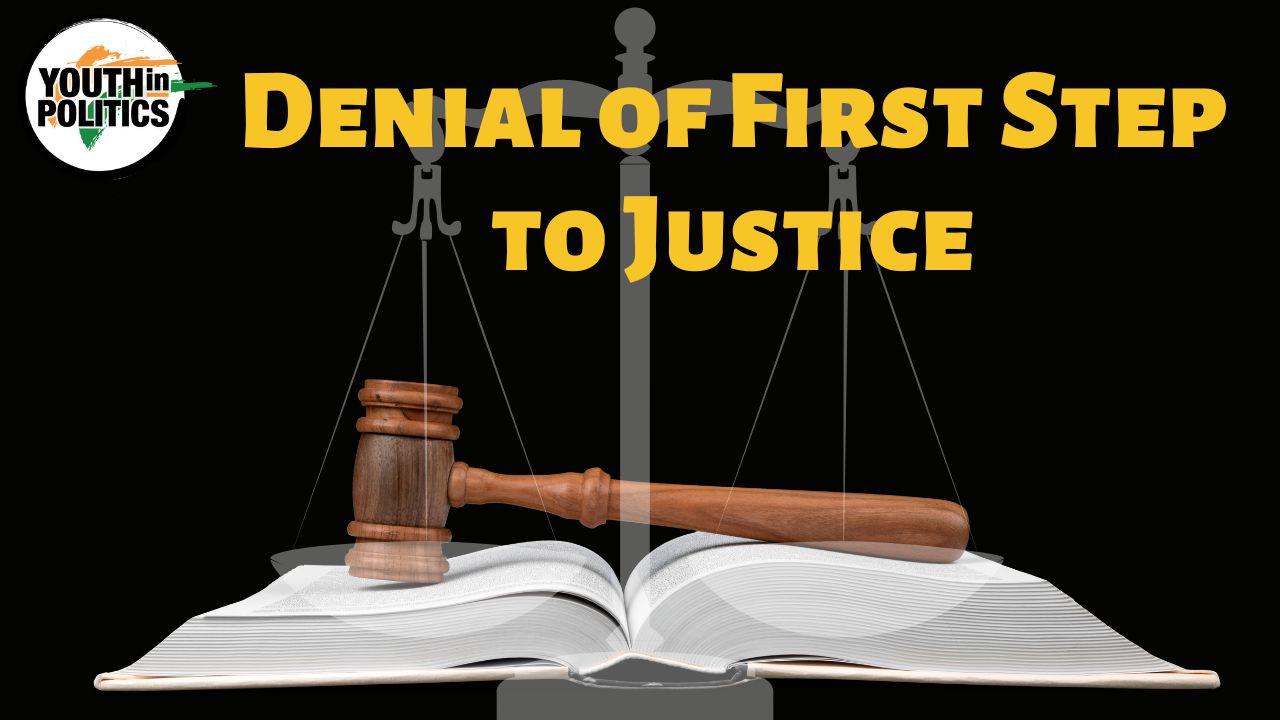
Written by Avi Gupta
The police authorities have an important contribution to the holistic development of a country, as they play a big role in maintaining law and order in society. Approaching the police is the first step people take when a crime occurs and the Police are expected to uphold the rights of the citizens impartially. While filing an FIR is the first step in seeking justice, sometimes the police itself becomes a barrier in filing the FIR.
It is important to learn that filing an FIR is just not a legal right, it is also a human right of every individual. But there have been instances when police have denied the complainants of their rights and asked them to not file complaints or misguide them. This is a pressing issue as this could simply mean denying the rights of citizens. The denial of filing an FIR leads to covering up the crime and which also means that not only the person is denied their rights, but the accused is set free without proper investigation. To address this problem the Supreme Court in 2013 passed a monumental judgement in the case of Lalita Kumari vs. Govt. of U.P and made it mandatory to file FIRs under section 154 of CrPC whenever the information about the commission of the cognizable offence is disclosed to the police. Section 154 of the Code of Criminal Procedure,1973 (Cr.P.C.) permits the police officer to write down the details when any cognizable offence is reported to them by the informant, then file the FIR, and at a later stage start the investigation. But various researches have revealed that the implementation of this judgement is almost zero on the ground.
There are many reasons why people are not able to file an FIR:
- First is legal literacy which means the knowledge of how to file an FIR, what to do if the police refuse to file an FIR, and understanding the future course of the complaint is very important. If the complainants are not acquainted with the scope of their rights they are easily manipulated by the police and hence most of the time aren’t able to decide the right course of action.
- Another important reason for not filing FIR could be to manipulate the numbers on the crime rate in the state, for example in Delhi crime rate was falling constantly from 1998(64,882 cases) to 2012(54,287 cases) but the trend changed in 2013 when the number of cases registered started to increase and in 2013 itself 80,184 new cases were recorded and it is said to be because of the new leadership of B.S. Bassi, the former Delhi police commissioner, encouraged the police station to file all the cognizable offences. This simply shows that the crime data is suppressed highly and the motivation behind could be to show progress in terms of crime rates.
- Thirdly, One of the problems that were highlighted by the police officers in a research conducted by a lawyer in 2021 was the lack of staff to handle the caseloads. The reluctance comes from the fact that even if they file a complaint they won’t be able to follow up and investigate properly. Another reason pointed out was that the officers have to work round the clock and the working hours and conditions are not good and these officers don’t get paid for the overtime hours they put in. This could possibly lead to a lack of motivation to take up more work and the result is the non-filing of the FIR.
- Lastly, Operational Freedom/authority: Anyone who is going to the police to seek help is at the mercy of the police. The police hold an authoritative position and also hold the freedom to decide whether a particular case was a cognizable offence or not. The officers who are responsible for filing cases might not file the case because they think the work they already have a lot of or they are instructed not to file cases. All of this mishandling only happens because the police have operational freedom. The officers are not held accountable for the mishandling of these cases and hence the number of people who aren’t able to file FIRs is higher. Various researchers argue that providing operational freedom to police officers can be very positive, but I believe providing this operational freedom without the burden of responsibility is very harmful.
In the end, I would like to say that while the Supreme Court has made it mandatory to file FIR for all cognizable offences it is evident that the people still face a lot of problems in filing the FIR and the authorities fail to address the issue with the urgency that it needs and the citizens are being denied their rights. From the perspective of the complainants, it is found that the police very often misguide the complainants or blame the victim. The police themselves work under a lot of pressure and the caseload on them is delaying work and increasing their work hours. The evident problem here is the lack of human resources and the lack of accountable systems of governance that complainants can access if they are denied their legal rights.
Therefore, it is evident that there is an urgent need for reforms in terms of building better and more accountable systems for the citizens. Also, there is an urgent need for the state to focus on the legal literacy of the people. “As a citizen, we are supposed to know the law made by the state, whether we intend to obey it or break it.”

Leave a Reply